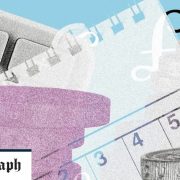Buying a home used to be so easy. All a borrower would need was a meeting with the local bank manager and a few recent payslips.
In the case of self-cert mortgages, dubbed “liar loans”, even the payslips became unnecessary. Mortgage lenders allowed people to take out loans without any proof of income, something that was a key factor behind the financial crash more than a decade ago.
That lax attitude landed banks in hot water with the City watchdog, which forced lenders to implement tough new lending rules in 2014 under the Mortgage Market Review.
Now would-be borrowers must spend hours answering detailed questions about their spending habits, debts and future plans. Complex “affordability assessments” will then determine whether the bank thinks a borrower will be able to repay the loan, leaving customers with a nervous wait to see whether they will be approved.
It is not just first-time buyers who must jump through these hoops; customers looking to remortgage to a cheaper deal elsewhere are also subjected to this forensic analysis.
Stress testing
Borrowers must not only prove that they can afford the mortgage on offer, but that they could also cope with significantly higher repayments. Even if a borrower is taking out a loan at 2pc, they will be stress tested by banks at 3 percentage points above the standard variable rate, which is the rate borrowers will be charged after the initial loan period expires.
This could leave borrowers having to prove they could afford interest rates upwards of 8pc, when the actual rate is a fraction of that.
This has created the perverse situation where some borrowers have been told they cannot pass an affordability test, even though their existing mortgage has higher monthly payments. These people, trapped on their existing loan, have been dubbed “mortgage prisoners”.
The vast majority of mortgages are sold on an advised basis. This means the customer must use a dedicated mortgage broker, a financial adviser, or a bank’s own staff member. This adviser will note down all expenditure and try and find a suitable loan.
This process can include asking whether an applicant has high-interest loans, whether they gamble regularly and if they are planning any significant life changes in future such as leaving their job. There are some exceptions for high net worth individuals, but the vast majority of people should expect to answer in-depth questions on their financial life.
Telegraph Money rounds-up the major questions borrowers should be prepared to answer questions on.
The key questions
- Do you have children?
- Are you planning to start a family or have more children?
- Do you have any plans to leave your job, start a business or become self-employed?
- Do you expect your income to fall over the next few years?
- Have you ever taken out a payday loan?
- Do you ever gamble?
How much do you spend on:
- School fees
- Eating out
- Child maintenance
- Socialising
- Hotels
- Alcohol
- Cigarettes
- TV and internet subscriptions
- Mobile phone
- Gym memberships
- Essential and non-essential travel
- Parking
- Clothing and footwear
- Haircuts
- Personal grooming
- Cleaning products
- Dry cleaning
- Pets
- Dental care
- Eye care
- Childcare
- Groceries
For the week’s most important personal finance news, analysis and expert advice, from pensions and property to investment ideas and savings tips, sign up to our weekly newsletter.
























Comments